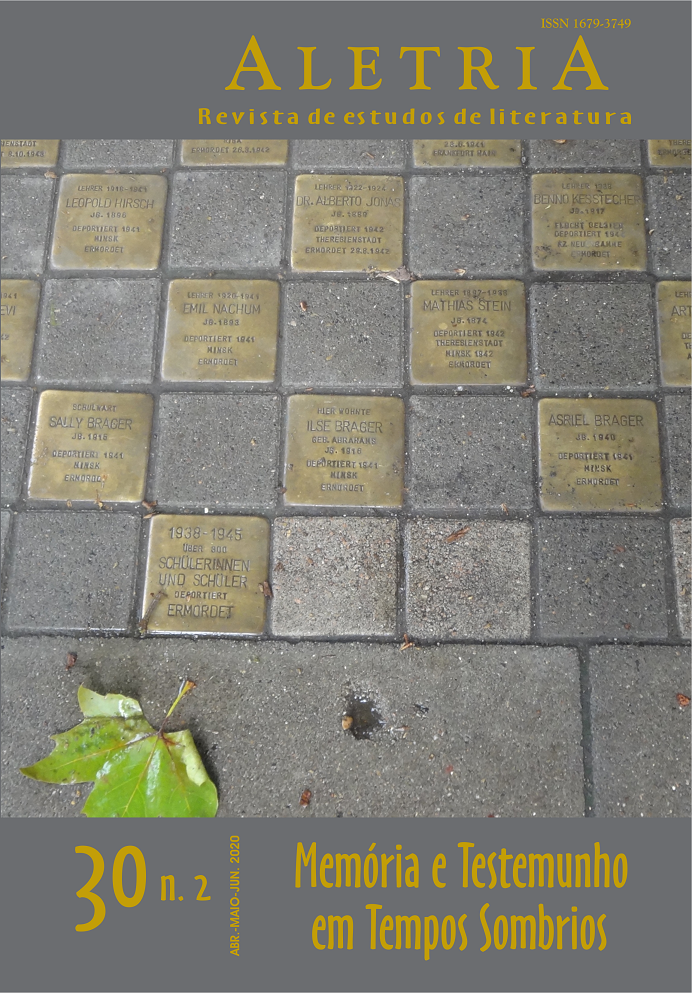Sequestrados pela história
O mercador de Veneza, George Tabori e a memória do Holocausto
DOI:
https://doi.org/10.35699/2317-2096.2020.21947Palavras-chave:
Shakespeare, O mercador de Veneza, memória, Holocausto, George TaboriResumo
O artigo considera O mercador de Veneza, de Shakespeare, uma obra singularmente transformada pelos eventos do Holocausto, sendo frequentes as encenações em que ela se torna pretexto para recordar aqueles acontecimentos. Discute-se a peça como arquivo de trauma, para refletir sobre sua possibilidade de testemunhar as atrocidades cometidas na guerra. Para esse fim, examinam-se perspectivas variadas do conceito de trauma e suas representações, apoiando-se nas incursões de Giorgio Agamben pela aporia do testemunho. Vale-se, além disso, da noção de testemunho como um ato performativo de fala, segundo as ideias de Shoshana Felman. Finalmente, o artigo examina três adaptações distintas da peça, realizadas na segunda metade do século XX por George Tabori (1914-2007), dramaturgo e diretor judeu húngaro.
Downloads
Referências
AGAMBEN, Giorgio. O que resta de Auschwitz. Tradução de Selvino J. Assmann. São Paulo: Boitempo, 2011.
AGAMBEN, Giorgio. Remnants of Auschwitz. Translated by Daniel Helle-Roazen. New York: Zone Books, 1999.
ASSMANN, Aleida. Espaços da recordação: Formas e transformações da memória cultural. Campinas: Editora da Unicamp, 2011.
BERRY, Ralph. The Merchant of Venice. In: OCCHIOGROSSO, Frank (ed.). Shakespeare in Performance: A Collection of Essays. Newark: University of Delaware Press, 2003. p. 46-57.
COLE, Tim. Selling the Holocaust from Auschwitz to Schindler: How History is Bought, Pachaged and Sold. New York: Routledge, 2000.
DIEDRICH, Antje. “The Grey and the Coloured Truth”: Memory and Post-Memory in George Tabori’s Plays. Journal of Literature and Trauma Studies, Lincoln, v. 3, n. 1, p. 1-21, 2014. DOI: https://doi.org/10.1353/jlt.2014.0017. Available at: https://muse.jhu.edu/article/581055. Date of access: 10 Sept. 2018.
FEINBERG, Anat. Embodied Memory: The Theatre of George Tabori. Iowa City: University of Iowa Press, 1999.
FELMAN, Shoshana. Testimony: Crises of Witnessing in Literature, Psychoanalysis, and History. New York/London: Routledge, 1992.
HOROWITZ, Arthur. Shylock after Auschwitz: The Merchant of Venice on the Post Holocaust Stage – Subversion, Confrontation and Provocation. Journal for Cultural and Religious Theory, Denver, v. 8, n. 3, p. 7-19, 2007.
KENNEDY, Dennis. Looking at Shakespeare. Cambridge: Cambridge University Press, 1993.
RIEFF, David. The United States Museum of Holocaust Kitsch. Foreign Policy, Washington, DC, 14 abr. 2016. Available at: http://foreignpolicy.com/2016/04/14/the-united-states-museum-of-holocaust-kitsch/. Date of access: 10 Feb. 2018.
SCHÜLTING, Sabine. Evoking the Holocaust in George Tabori’s Productions of The Merchant of Venice. In: SHAPIRO, Michael; NAHSHON, Edna (ed.). Wrestling With Shylock: Jewish Responses to The Merchant of Venice. Cambridge: Cambridge University Press, 2017. p. 224-242. DOI: https://doi.org/10.1017/9780511845789.011.
SELLIGMANN-SILVA, Márcio. O local da diferença: Ensaios sobre memória, arte, literatura e tradução. São Paulo: Editora 34, 2005.
SHAKED, Gershon. The play: gateway to cultural dialogue. In: SCOLNICOV, Hanna; HOLLAND, Peter Holland (ed.). The Play out of Context: Transferring Plays from Culture to Culture. Cambridge: Cambridge University Press, 1989. p. 7-21.
SHAKESPEARE, William. A Midsummer Night’s Dream. Edited by Madeleine Doran. In: HARBAGE, Alfred (ed.). The Complete Pelican Shakespeare. New York: Viking Penguin, 1977. p. 146-174.
SHAKESPEARE, William. Romeo and Juliet. Edited by John Hankins. In: HARBAGE, Alfred (ed.). The Complete Pelican Shakespeare. New York: Viking Penguin, 1977. p. 823-854.
SHAKESPEARE, William. The Merchant of Venice. Edited by John Drakakis. London: Arden Shakespeare, 2010. (The Arden Shakespeare. Third Series).
SHAPIRO, James. Shylock the Jew on Stage: Past and Present. Shofar, v. 4, n. 2, p. 1-11, 1986. Available at: http://www.jstor.org/stable/42940755. Date of access: 2 May 2020.
SILVERSTONE, Catherine. Shakespeare, Trauma and Contemporary Performance. New York: Routledge, 2011. DOI: https://doi.org/10.4324/9780203862940.
WORTHEN, W. B. Disciplines of the Text: Sites of Performance. In: BIAL, Henry (ed.). The Performance Studies Reader. London/New York: Routledge, 2004. p. 10-25.
Downloads
Publicado
Edição
Seção
Licença
Copyright (c) 2020 Maria Clara Versiani Galery (Autor)

Este trabalho está licenciado sob uma licença Creative Commons Attribution 4.0 International License.
Autores que publicam nesta revista concordam com os seguintes termos:Autores mantém os direitos autorais e concedem à revista o direito de primeira publicação, com o trabalho simultaneamente licenciado sob a Licença Creative Commons Attribution que permite o compartilhamento do trabalho com reconhecimento da autoria e publicação inicial nesta revista.Autores têm autorização para assumir contratos adicionais separadamente, para distribuição não-exclusiva da versão do trabalho publicada nesta revista (ex.: publicar em repositório institucional ou como capítulo de livro), com reconhecimento de autoria e publicação inicial nesta revista.Autores têm permissão e são estimulados a publicar e distribuir seu trabalho online (ex.: em repositórios institucionais ou na sua página pessoal) a qualquer ponto antes ou durante o processo editorial, já que isso pode gerar alterações produtivas, bem como aumentar o impacto e a citação do trabalho publicado (Veja The Effect of Open Access).














